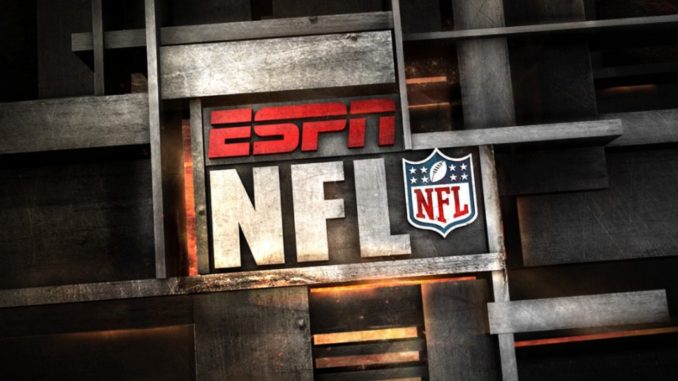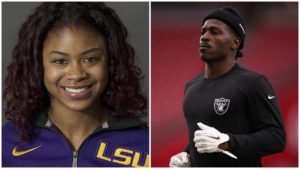
By Keith Glock
CONJSports.com Founder
@conjsports
For the better part of August, ESPN, NFL Network and Fox / Fox Sports were inundated with stories about star-crossed wide receiver Antonio Brown.
The stories were bananas. He had given himself frostbite by improperly freezing his tootsies in a cryo-chamber, he battled the NFL with grievances about his helmet of choice and even confronted his ex-general manager Mike Mayock, hurling at him a racial slur.

And we watched it all live, front-and-center, on our TVs.
Monday afternoon during ESPN’s NFL Live show, it took the network over 40 minutes to begin its reporting of a second alleged act of sexual misconduct related to star-crossed wide receiver Antonio Brown.
So as the tide of impropriety has made a serious turn for the worse, the networks have stepped-back their coverage of Brown and his mis-deeds quicker than a James Harden jumpshot.
Speaking for, and in the parlance of, millennials everywhere, “WHY are the sports networks not wall-to-wall on this?”
Sure, there are going to be some ancillary rationales thrown out there as to why there is not more attention being paid to the Raider-turned-Patriot:
- A very parochial (to put it mildly) Boston media which is often loathe to criticize its sports teams, most especially Bill Belichick, the grand poo-bah Patriots head coach himself, as well as the quarterback messiah Tom Brady.
- There are actual games being played as opposed to the previous stories, which occurred in the offseason.
The answer, though, is a sobering reminder of the sad reality, which permeates so many other things in life: money. Roughly $1.9 BILLION worth of money.
Why WOULD the major networks want to report this story?
Over the last 24 months, popular culture, social media and strong-willed women have brought the harrowing realities of sexual assault and the imbalance of power between the sexes into the living rooms of American families.
Harvey Weinstein, Bill Cosby, R Kelly.
Just typing their names makes the fingers try to find the bottle of hand sanitizer on their own.
You can add Brown to the list.
He finds himself on the business end of a civil suit alleging sexual assault. Combine that with a fantastic piece of reporting by Robert Klemko of SI which details multiple pending lawsuits from former aids and independent contractors as well as a second act of alleged sexual misconduct, and rationality says that the masses would consume this kind of news ferociously.
Why WON’T They Give it Due Weight?:
There is a simple cause and effect relationship regarding television audiences and the advertising dollars those audiences can demand. The bigger the audience, the bigger the fee.
There’s a similar causal relationship between the type of game being played to the size of the audience. The more nationally popular the teams involved in the game are, the bigger the rivalry that exists, the bigger the audience.
Networks like ESPN know that they have no control over what games the league decides to play on Monday Night Football, a product for which they pay the NFL $1.9 billion annually.
The total sports network was already on thin ice with the most profitable sports business in America, as the two have already had their dust ups.
The Sports Business Journal wrote in 2018 of the increasingly chilly relationship between the two sides, with the league miffed at the amount of negative light some pretty talented journalists rightly shone on issues like brain trauma and domestic violence.
With the little amount of attention it’s paying to Brown’s downward spiral, it’s safe to say that the network heard the message loud and clear: cut the negative reporting or we will feed you the crappiest games possible.
And as the Disney Company’s sports arm is hemorrhaging money, the NFL is its last big-ticket item that consistently draws ratings (the NBA is a big-ticket item, but the scattershot ratings pale in comparison to the NFL.)
Ratings mean dollars.
Fitting This Into The Big Picture:
The first amendment to the United States Constitution is most notably associated with the freedom of speech. Rightly so. But the Founding Fathers made sure to include an important stipulation into that amendment in the words immediately following freedom of speech, which reads, and of the press.
“Congress shall make no law respecting an establishment of religion, or prohibiting the free exercise thereof; or abridging the freedom of speech, or of the press; or the right of the people peaceably to assemble, and to petition the government for a redress of grievances.”
When those words were written in the 18th century, there’s no way that our forefathers could have envisioned rocket ships to the moon or satellites in outer space that can beam the press’ information into portable newspapers that we all keep in our pockets called cellphones.
But what they did understand was the importance that a free press had – without censure – to keep the populous informed.
The bottom line is that not much has changed since George Washington’s day in that people form their opinions based on the stories of which the press informs them.
The multiple outlets from which we get that news (Fox, NBC, CNN, ABC, ESPN) and the vehicles we use to retrieve it (Twitter, Facebook, Google) are the massive changes.
And despite those changes, the public can only consume what it is given.
Unbiased journalism is shrinking. Rising are network specific viewpoints about what stories to present and how to present them, with the deciding factors becoming more based on a politically motivated, one-side-of-the-aisle slant.
It is the exact opposite of our forefathers’ intentions. And until, as a society, we decide that we have reached a tipping point, and demand a slantless perspective based on relevance and importance, the press will continue to devalue its credibility in favor of valuing its pocketbook.
And for that, we should be ashamed.

Leave a Reply